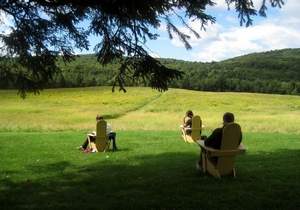 My Iowa Summer Writers’ Festival catalogue arrived in the mail.
My Iowa Summer Writers’ Festival catalogue arrived in the mail.
Mind you, I don’t plan to enroll in any workshops, but I esteem the concept of creative vacations.
Writers’ conferences are a big industry nowadays, and it could be argued that they exploit aspiring writers. Can you write a sentence? Then I guarantee you will be accepted in a workshop. But even if most of your fellow students are mediocre, and possibly strung-out when they discover their book is not material for the next Oprah Book Club, it is still likely that 9-to-5ers or tired teachers and journalists will enjoy chatting with others about writing and even gain some constructive criticism.
There is a boom in writers’ conferences. The first and most famous is Bread Loaf, founded in 1926, at Middlebury College in Vermont. But nowadays one can mercilessly edit one’s poetry at a conference on a beach in Hawaii, or scribble that novel in Adirondack chairs in the Carolina mountains.
I really should get that novel out of the drawer. I wonder where the hell it is. It might be fun to revise it and attend a workshop on Novel Craft, or perhaps Where to Begin in Fiction?
At a career crossroads a few decades ago, I went to a writers’ conference. I carefully honed the short story I planned to workshop: the overeducated young heroine, who idealized the poor, found herself unhappily ensconced in an urban neighborhood where junkies smoked behind her garage and immigrants walked goats down the street.Did the teacher like the story? No. He hated it. He finally praised one of my stories, after I had removed all adjectives, adverbs, and, if I remember correctly, commas.
Oddly, I did learn a lot. His tough criticism (did he have to be so brutal?) and unequivocal exercises taught us to focus, shape a plot, and ramble less.
The best thing about the conference, though, was hanging out. The other students were fun, charming, and supportive. We walked on the beach, jogged around campus, and tried to keep the prima of the workshop from f—-g every guy in sight. She was such a good writer, but never published a book. Talent doesn’t always win.
Although writers’ conferences are continuing education programs, and have nothing to do with MFA programs, creative writing programs are constantly under attack. People are critical of what they call “workshop” fiction, though what that means I do not know, and I doubt that they could define it. Many brilliant writers come out of these programs. Alumni of the Iowa Writers Workshop alone include Flannery O’Connor, Rita Dove, Charles Wright, Andre Dubus, T. C. Boyle, Jane Smiley, Alan Garganus, Michelle Huneven, Lucy Grealy, Karen E. Bender, and Paul Harding.
In the Feb. 27 issue of The Stranger, Ryan Boudinot’s article, “Things I Can Say About MFA Writing Programs Now That I No Longer Teach in One,” attacks MFA programs. He dismisses the majority of the MFA students as talentless. He writes,
I recently left a teaching position in a master of fine arts creative-writing program. I had a handful of students whose work changed my life. The vast majority of my students were hardworking, thoughtful people devoted to improving their craft despite having nothing interesting to express and no interesting way to express it. My hope for them was that they would become better readers. And then there were students whose work was so awful that it literally put me to sleep. Here are some things I learned from these experiences.
Heavens, what did Boudinot expect? They are students, not professionals. The MFA programs give them time to write, and some will develop their talent. Although most will not publish much (I’ve known some very smart MFAs who have simply vanished after graduating), it is not necessarily a wasted experience. Does creativity always have to lead to publication?
Of course writers’ conferences are different from MFA progams. Students are amateurs, though some are very good. Perhaps they are not the next Oprah book club writer, but I do know five people who have published books after attending these conferences.
And so, my philosophy is, go to the conference if you want to, if you’re stuck, or need some help, or just want to chat to people who write. Write. Enjoy. And worry about the publishing tomorrow.


I would *love* a writer’s retreat – and even if you don’t end up producing a War and Peace, writing skills are going to be useful in lots of other ways!
LikeLike
These conferences can be great! I know people who attend them again and again, and every instructor has a different style. It’s lovely to have time to write.
LikeLiked by 1 person
I assume people who become students on MFA programs are trying to enter the publishing world by enveloping themselves with contacts. They also probably have faith in what they are taught and get published by small periodicals supported by such programs. The conference is like all of them: you like to be with your tribe. You feel better to be with others with the same goals and ways of passing time as you have.
LikeLike
You’re right! It is good to be with people who like the same things. I do think many people improve their writing through these intense one- and two-week sessions. Most are too old to drop out of the workplace, and many are serious enough that this takes the place of them. I made friends and for years we sent our fiction back and forth and made suggestions.
LikeLike